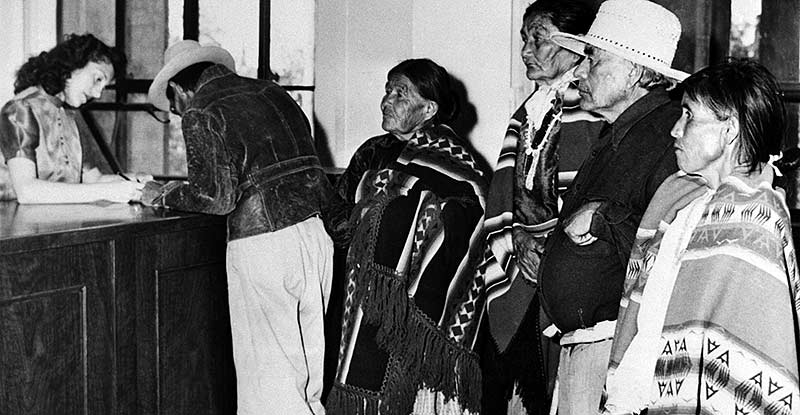
The election for tribal chairman will be held next Tuesday and the Navajo Times is reporting the most competitive race in years. The newspaper gave no indication whether incumbent Chairman Raymond Nakai or challenger Peter MacDonald was favored to win because no one at that time had any idea how the electorate was leaning since both sides seemed very confident that they had more supporters than their opponent.
The tribe’s election office reported that more than 3,000 names had been added in the last few months bringing the total number of registered voters to more than 42,000 voters, the biggest in the tribe’s history.
In 1974, the Times began the practice of taking informal surveys to get a sense of how the election was going but in 1970 the newspaper did not have the resources to do that, not having a full-time reporter to do the poll. But even if the paper had the resources, the big question would be how to do a survey that was anywhere near accurate given the unique aspects of the reservation.
For example, most polls are done through telephone interviews but in 1970 the number of families listed in the reservation phone book was only a small fraction of the total population. In 1970, many Navajos with telephones opted not to have their phone number listed for fear of getting random calls from people trying to get hold of people in their area who did not have phones.
Only a few chapter houses – those in major population centers – had phones so those with their phone numbers listed were a small number. In later years, Times reporters would go to a supermarket and ask customers who they supported but this was almost useless in trying to get an idea of how the election was going since it only surveyed a single segment of the voting population, such as families who lived in the area.
Beginning in 1982, reporters started taking the surveys on weekends by going to Wal-Mart in Gallup since the store’s customers, especially on Saturdays, came from all parts of the reservation.
Another reason for the lack of any analysis of the election was a political one. It would be political suicide for a Times editor to publish a story indicating that MacDonald was favored to win.
Campaign officials for Nakai noted that people going to his rallies tended to be over 50 while MacDonald attracted younger voters, which was favorable to Nakai since very few of the young voted, allowing the election to be controlled by older voters. MacDonald seemed to have an advantage over Nakai in radio ads.
The impression was that MacDonald had far more money at his disposal than Nakai and the rumor was that a lot of MacDonald’s money was coming from donations by non-Navajo interests, which was illegal under tribal laws. There were no reports in the Times that the two candidates ever debated each other, but if they did the lack of a reporting staff would make coverage of such an event unlikely.
By this time, Dick Hardwick, the paper’s managing editor, had sent a letter to his superiors at the Bureau of Indian Affairs to allow him to come back to work as the BIA’s tribal operations officer after the election. He had been assigned to work at the newspaper after Nakai made a special request to have him detailed to run the newspaper.
Over the years, he had complained about his frustrations with running the paper. His biggest complaint was not having enough funds to hire a full-time reporter, forcing him to do much of the writing in addition to running the newspaper. He also complained about the pressure placed on him by tribal officials in Nakai’s office to do positive stories about Nakai. He told BIA officials if Nakai won the election, he would stay on for a month or two to give him time to find a replacement.
If MacDonald won, he would stay until MacDonald was inaugurated. Despite the fact that his salary was paid by the BIA, he continued to have problems getting the Tribal Council to give him enough funds to hire a reporter. The Council each year decided how much money to give the paper to operate. Any money the paper made went back to the tribe. Since the paper was still operating at a loss each year, the Council gave the paper just enough money to pay for its present staff and the cost to print the newspaper in Albuquerque.
Hardwick privately said he hoped MacDonald won the election because he felt MacDonald would want to see the paper improve by providing funds to hire a full-time reporter.
"difficult" - Google News
November 05, 2020 at 07:35PM
https://ift.tt/3oZXivc
50 Years Ago: In 1970, polling Diné voters is difficult task - Navajo Times
"difficult" - Google News
https://ift.tt/2VWzYBO
https://ift.tt/3d5eskc
Bagikan Berita Ini














0 Response to "50 Years Ago: In 1970, polling Diné voters is difficult task - Navajo Times"
Post a Comment